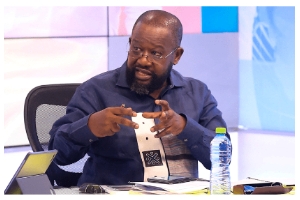 Kwame Jantuah, a leading member of the CPP
Kwame Jantuah, a leading member of the CPP
A leading member of the Convention People’s Party (CPP), Kwame Jantuah, has called for a national development plan led by an independent authority to drive Ghana’s progress.
Speaking on Starr FM with Naa Dede Tettey, Mr Jantuah highlighted the need for a unified, long-term approach to economic and industrial growth in the country, driven by the National Development Planning Commission (NDPC).
“Any sensible leader, looking at where the country is today, should recognize that we need a national development plan everyone can rally around,” Jantuah said. “We need an independent NDPC, just like the Electoral Commission, to move development forward in Ghana. Right now, the NDPC is under the presidency, which makes their actions subject to the president’s will. That shouldn’t be the case.”
Jantuah, who is also part of a team working on the Human Capital Development Strategy, emphasized that the country’s energy sector and industrial base are key components of development. He argued that Ghana’s natural resources, if fully utilized and industrialized, could drive the nation’s growth independently, rather than relying on foreign aid.
“The only reason foreign governments support us is because we are resource-rich. Countries like Singapore, which lack our natural resources, have surpassed us in development because they add value to whatever they have,” Jantuah explained. “If we leverage our own resources, we can do the same.”
Reflecting on promises made by the current administration, Jantuah expressed disappointment over the government’s inability to fulfill its vision of shifting the economy “from taxation to production.”
“When the president initially promised this shift, there was hope. But here we are, with no substantial progress,” he said. “Take ‘One District, One Factory’ – before investors can access it, they’re required to put down 10 percent upfront. How does that encourage local industry? We need an approach where capital flight is minimized, and local production is truly prioritized.”
Jantuah cited the example of a Ghanaian entrepreneur who proposed a solution to reduce rice imports by increasing local production but was ignored. “The gentleman told us he could help us reduce rice imports, but we didn’t support him. He went to Nigeria instead, and look at the results there. Meanwhile, we’re still relying on imports that undercut our own production,” he noted. “We have factories here producing basmati rice, but they had to close because cheaper imports flooded the market.”
As a member of the Association of Ghana Industries (AGI), Jantuah underscored the urgency for government intervention to support local industries that struggle against foreign imports. “Those who are importing are making profits while local factories close down. This happens because some politicians have interests in the imports, harming our local industry,” he concluded.
Jantuah’s comments come amid widespread calls for Ghana to build a resilient economy that relies less on imports and more on local production. He urged leaders to prioritize sustainable development policies that would benefit future generations and create a stable economy built on Ghana’s resources.